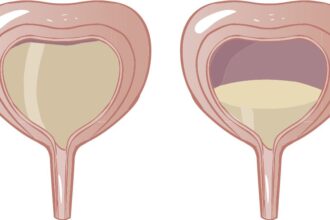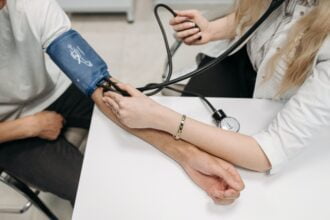1. What Is the Male Menopause?
The male menopause is also called the andropause, androgen deficiency in the aging male (ADAM), late-onset hypogonadism (LOH), or testosterone deficiency syndrome (TDS). From the age of 30, testosterone starts to decrease but does not usually cause any symptoms.
- 1. What Is the Male Menopause?
- 2. Symptoms of the Male Menopause
- 3. Diagnosis of the Male Menopause
- 4. Treatment of the Male Menopause
- 5. Benefits of Testosterone Therapy?
- 6. Risks of Testosterone Therapy?
- 7. Natural Ways to Reduce Symptoms of the Male Menopause
- 8. Treatment for Enlarged Male Breasts (Gynecomastia)
Symptoms of the male menopause usually happen when men are 50 or older. However, it can be caused by medical conditions such as diabetes or cancer. Not all men will experience any symptoms, and the decline in testosterone varies with every man. When the male menopause is due to aging, testosterone decline is slower than when women go through menopause.
2. Symptoms of the Male Menopause
- Fatigue and low energy
- Depression and/or anxiety
- Low self-esteem
- Low sperm count and sex drive
- Erectile dysfunction (ED)
- Insomnia or sleep disturbance
- Hot flushes
- Sweating
- Weight gain
- Reduced muscle mass
- Change in size of testis and penis
- Decreased bone density and osteoporosis
- Enlarged male breasts (gynecomastia).
3. Diagnosis of the Male Menopause
A doctor will not diagnose the male menopause as it is not a medically recognized condition. If you are experiencing symptoms of the male menopause, your doctor will want to rule out any underlying medical conditions. This will involve a physical exam, during which the doctor will feel your testes to check for any lumps or changes and may conduct a standard rectal exam. Blood tests will also be taken to rule out diabetes and any other underlying medical problems and to check for decreased hormone levels.
4. Treatment of the Male Menopause
The primary treatment for the male menopause is hormone replacement therapy (HRT). This is available in various forms, and your doctor will discuss each one with you. The most popular form is a daily testosterone transdermal patch worn on your upper arm. The advantage is you can just forget about it once you have put it on.
Alternatives to a patch include:
- Testosterone gel in a packet. Suppliers include Testim, AndroGel, Axiron, Fortesta, and Natesto. Once a day, you apply the gel to your skin or, with Natesto gel, inside your nose.
- Testosterone mouth patch from Striant that you put on your upper gums twice a day.
- Testosterone injections (usually administered by a doctor) into the gluteal muscle (buttocks) every two to four weeks. You may be able to take them home and self-inject them into your thigh.
- Testosterone implants are small pellets inserted under the skin, usually in the buttocks or stomach. The testosterone is slowly absorbed into the bloodstream and lasts up to six months.
5. Benefits of Testosterone Therapy?
The results of testosterone treatment will vary. Some men find it effective at reducing their male menopause symptoms; others only have a slight decrease in symptoms. Testosterone replacement can also improve bone density and muscle mass. As testosterone decline varies from person to person, it can take a while to find the exact dose and form of testosterone treatment that works best.
6. Risks of Testosterone Therapy?
As with all medicines, testosterone treatment has associated side effects. The most common is skin irritation from the patch or gel. Research has indicated risks of testosterone treatment may be an increased risk of blood clots, deep vein thrombosis (DVT), cardiac arrest (heart attack), and stroke.
The research is limited due to a lack of clinical trials. A doctor may advise against testosterone replacement therapy if you have certain medical conditions, including:
- Benign prostatic hypertrophy (BHP). This is a growth of the prostate, which can cause problems with urination
- Elevated prostate-specific antigen (PSA) and prostate cancer
- Sleep apnea — a condition when you stop breathing for short periods during sleep
- Cardiac (heart) disease
- High blood pressure
- Epilepsy
7. Natural Ways to Reduce Symptoms of the Male Menopause
You can make changes to your lifestyle which may reduce male menopause symptoms, including:
- Stop smoking
- Changing your diet to eat more protein and less sugar and fat
- Weight loss
- Reducing alcohol consumption
- Exercise
- Talking therapy to help with anxiety and depression.
8. Treatment for Enlarged Male Breasts (Gynecomastia)
Some men will develop gynecomastia, the medical term for enlarged male breasts often referred to as man boobs. Men can develop enlarged breast glandular tissue due to a hormone imbalance when estrogen rises and testosterone declines. Typically, this happens after 50 and is associated with the male menopause.
Testosterone replacement will not get rid of man boobs. Gynecomastia surgery is the only permanent way to reduce male breasts caused by enlarged breast tissue. The type of surgery required will depend on the severity of your symptoms. Gynecomastia is categorized into four grades of gynecomastia by the American Association of Plastic Surgeons (AAPS).
Grades 1 and 2 gynecomastia surgery only require an incision around the edge of the periareolar. Once healed, scars are well hidden by the natural change in color between the periareolar and the surrounding skin.
Grades 3 and 4 gynecomastia are more severe, and surgery may be needed to remove excess skin as well as glandular and fatty tissue. The incisions run under the crease of the breasts and may extend towards the armpits. Scars are more noticeable but normally fade within a few months. Scar treatments such as silicone gel and silicone gel sheets are used to make scars flatter and finer. The patient satisfaction rate from successful gynecomastia surgery is high. For the best chance of an optimum outcome, it is strongly advisable to choose a Board Certified Plastic Surgeon to perform gynecomastia surgery.









